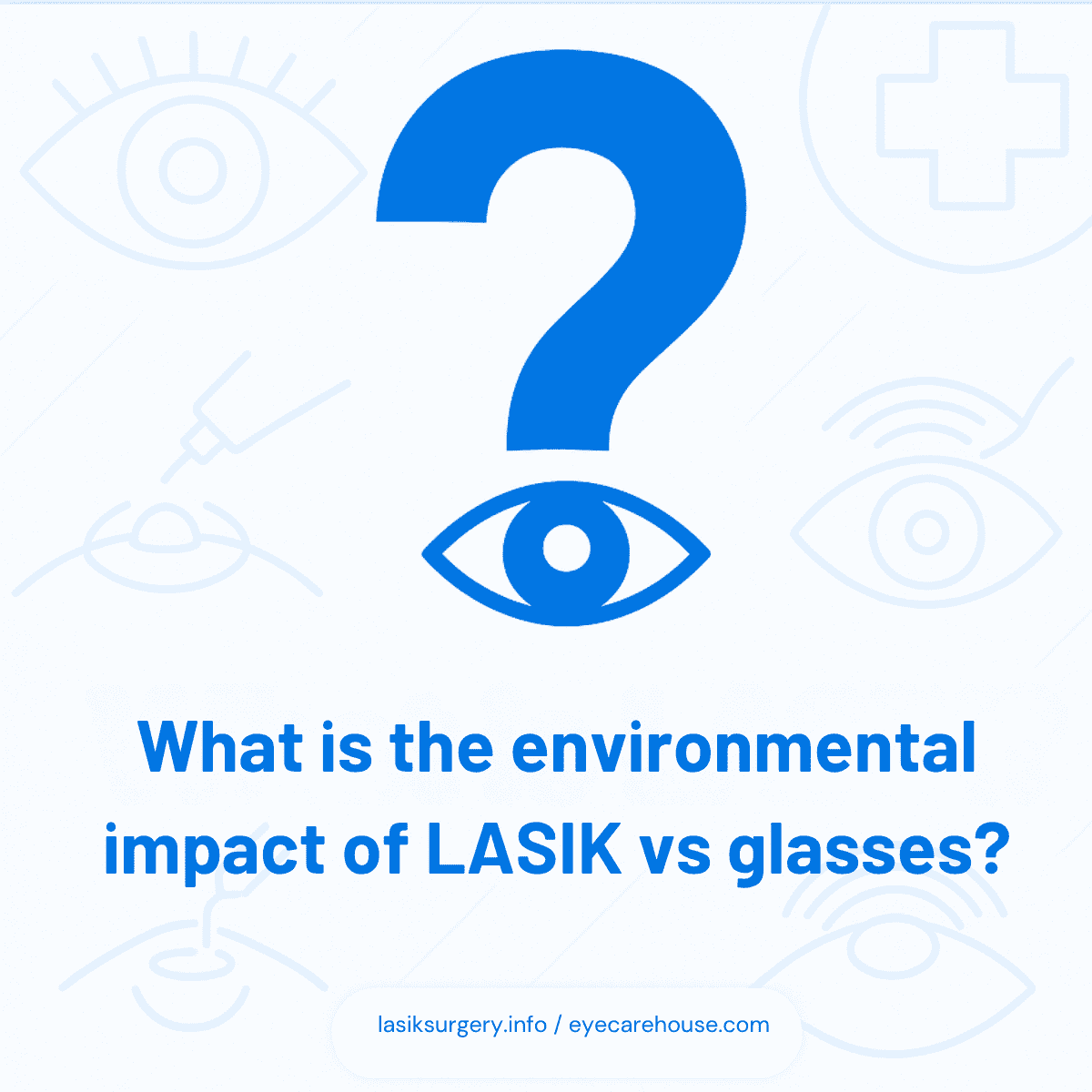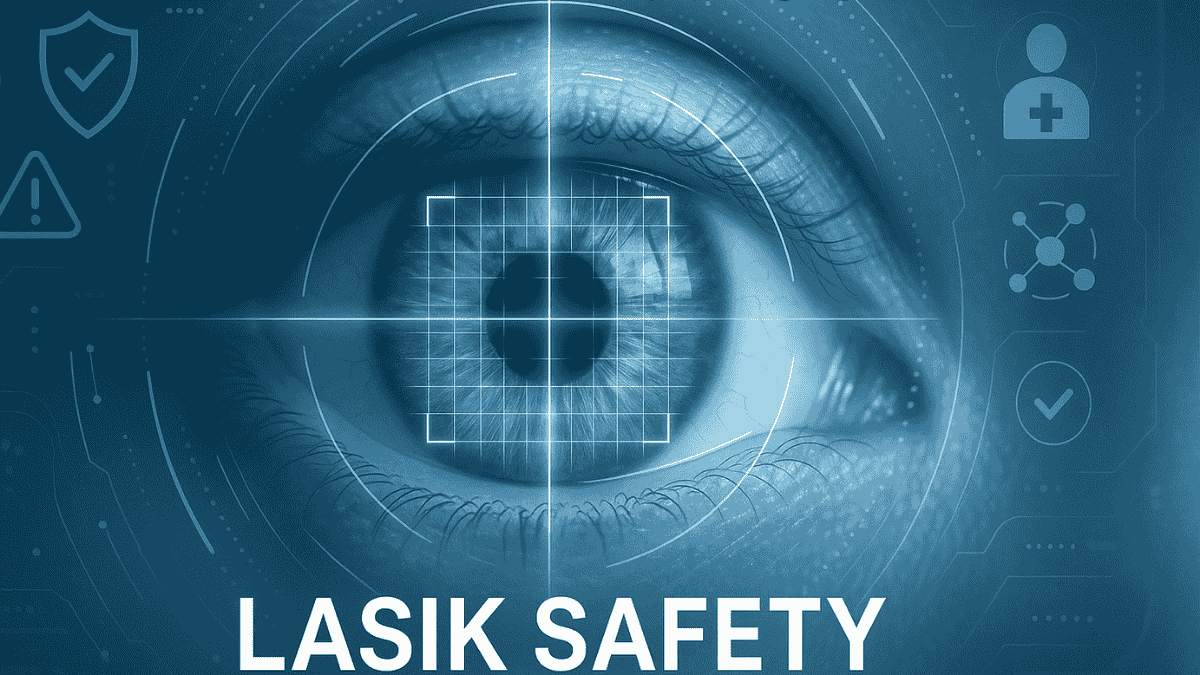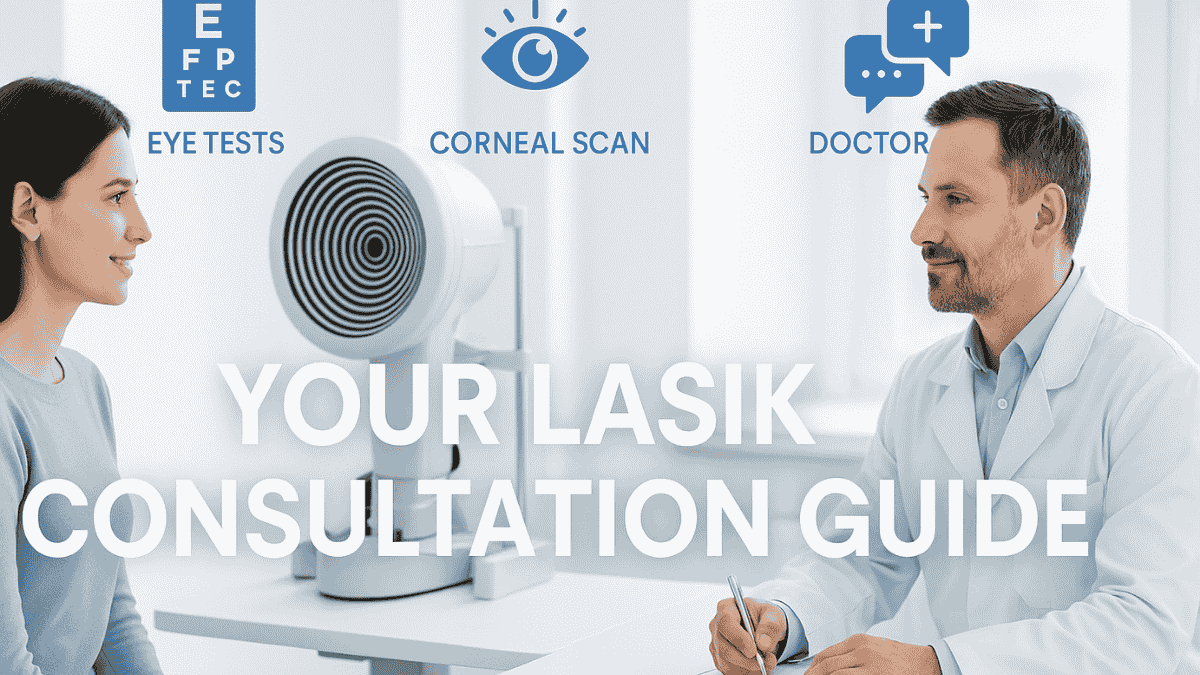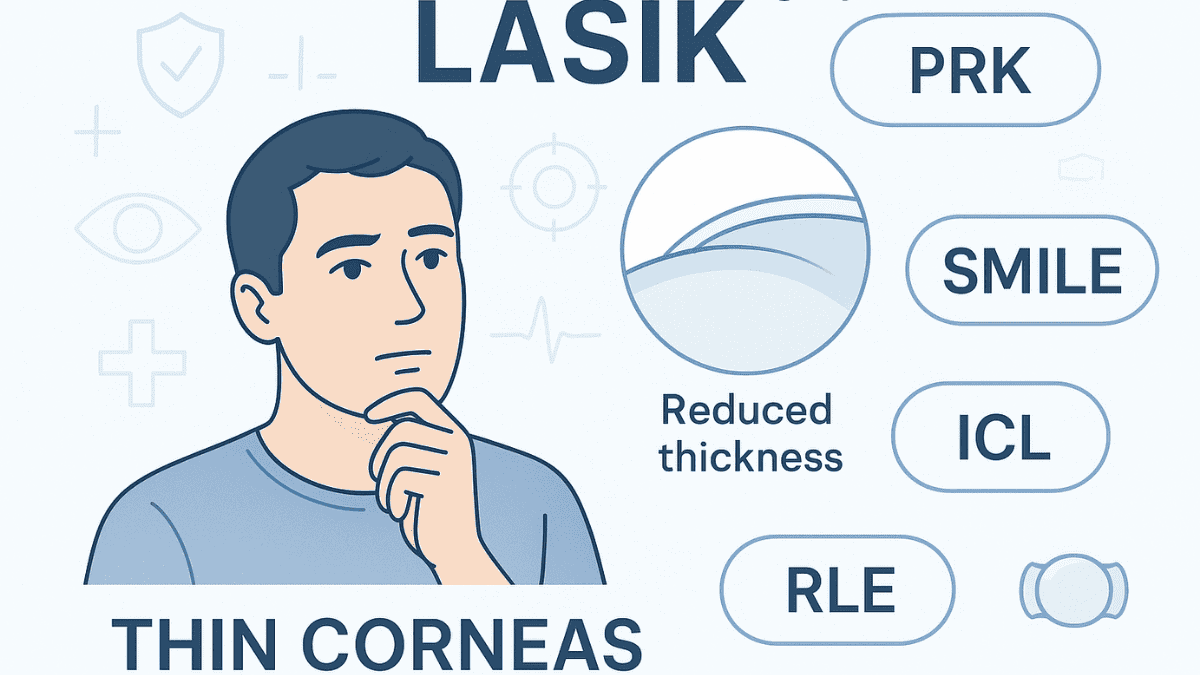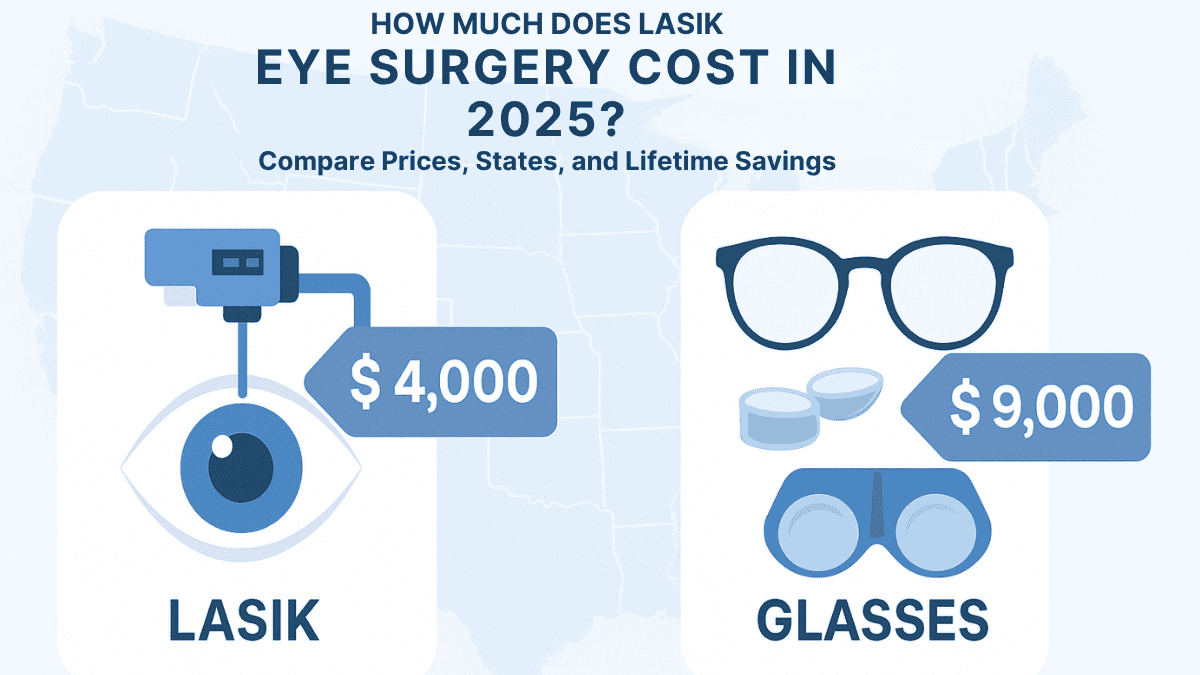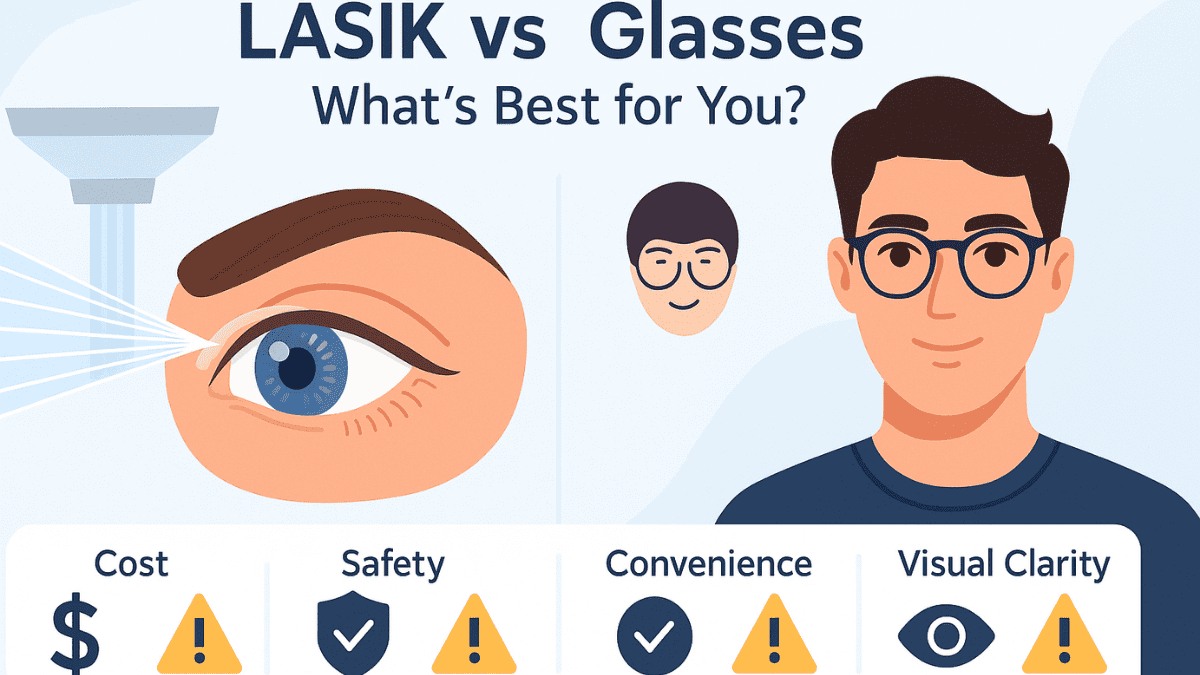
Thinking about ditching your glasses for LASIK? You’re not alone. Many people weigh the pros and cons of LASIK vs glasses every day, a significant decision impacting vision, lifestyle, and finances. Let’s break down the key differences to help you make an informed choice for your eye care.
LASIK and glasses both aim to correct your vision, but they do so through very different methods. LASIK, a form of laser eye surgery, is a surgical procedure that reshapes your cornea, while glasses are external lenses that bend light to focus it properly on your retina. Each vision correction option comes with its own set of advantages and drawbacks, influencing whether it’s a good option for you.
We’ll compare LASIK and glasses across several important factors. From surgery cost and convenience to safety and long-term results, we’ve got you covered. By the end, you’ll have a clearer picture of which path might be best for your eyes — lasik journey or continued use of prescription glasses.
Table of Contents
How LASIK and Glasses Work
LASIK, which stands for Laser-Assisted In Situ Keratomileusis, is a popular type of refractive surgery. The lasik surgical procedure employs a specialized laser to remove a precise amount of corneal tissue, altering its spherical shape. This modification allows light to focus correctly on the retina, thereby improving lasik vision and correcting refractive errors like nearsightedness, farsightedness, and astigmatism.
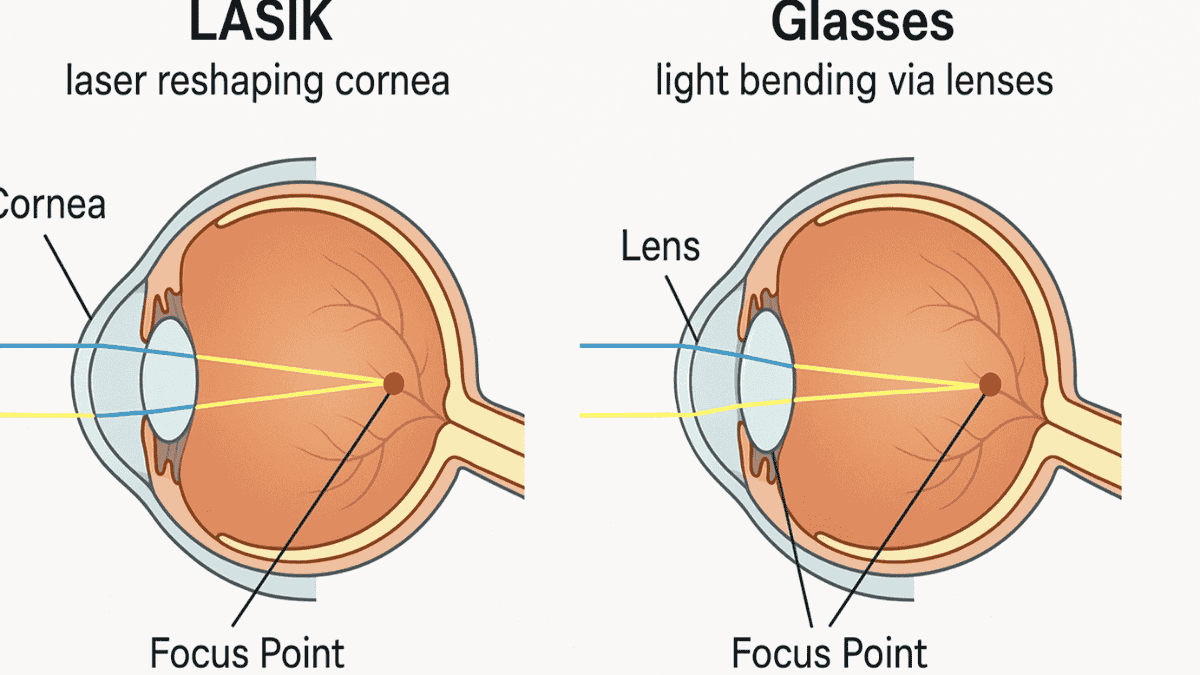
It’s a quick procedure, generally taking about 15 minutes per eye, and most people notice significantly improved vision within 24 hours. Other laser eye surgery options, sometimes recommended by eye surgeons for patients with thinner corneas, include photorefractive keratectomy (PRK), another form of laser surgery that also reshapes the cornea.
Glasses, a traditional form of vision correction, use corrective lenses to compensate for the eye’s inability to focus light accurately. Your eye doctor determines the prescription for your eye lenses after a comprehensive eye examination. Whether you wear glasses for minor or major refractive errors, these vision glasses work by bending light before it enters your eye, ensuring it lands perfectly on your retina for clear sight, a staple in eye care.
Cost Comparison: LASIK vs Glasses
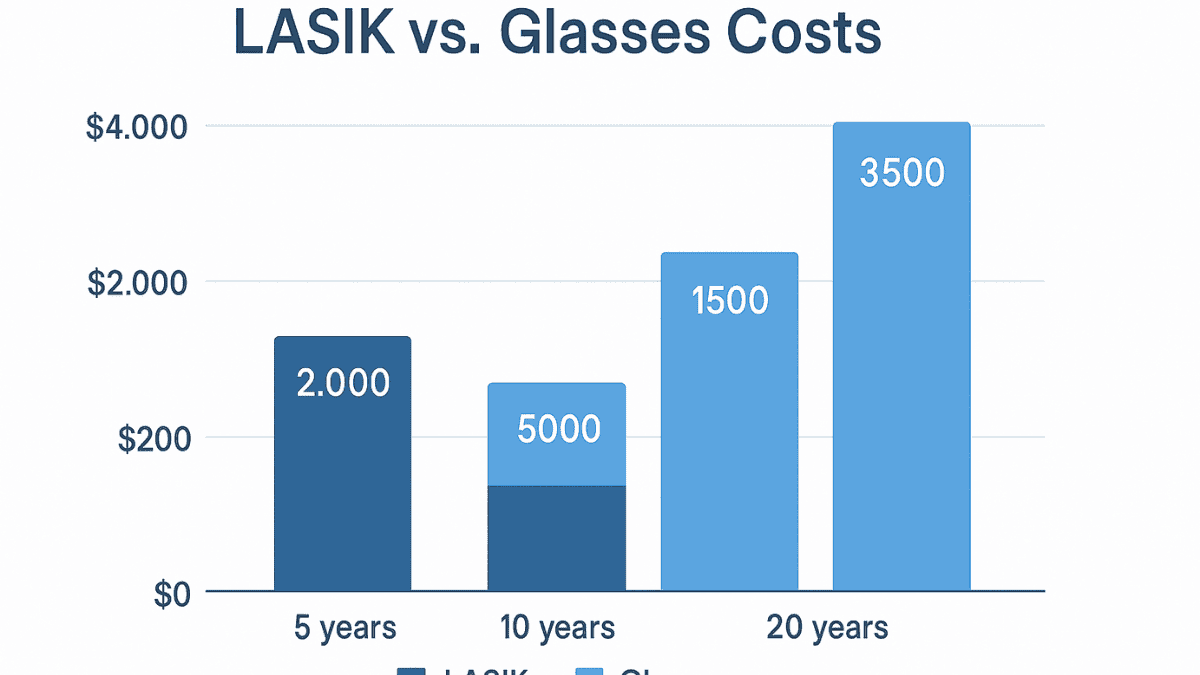
When it comes to the financial aspect, lasik eye surgery has a higher upfront price tag. On average, lasik surgery costs between $2,000 to $4,000 per eye, a figure that can vary based on technology and the surgeon’s expertise. This might seem like a substantial one-time expense for most people, but many lasik eye clinics offer finance options to make it more manageable.
Prescription glasses are cheaper initially, with a basic pair potentially costing $100 to $300. However, it’s important to remember that you’ll likely need to replace them every year or two as your prescription changes or frames wear out. Additionally, you might want multiple pairs for different activities or styles, and the same applies if you wear contact lenses, which involve recurring purchases of lenses and solutions.
Over time, the cost of glasses and contact lenses can add up significantly. Let’s look at a potential breakdown of this surgery cost versus ongoing expenses:
| Time Period | LASIK Cost (Approx.) | Glasses/Contacts Cost (Approx.) |
|---|---|---|
| 5 years | $4,000 – $8,000 | $500 – $2,500 |
| 10 years | $4,000 – $8,000 | $1,000 – $5,000 |
| 20 years | $4,000 – $8,000 | $2,000 – $10,000 |
As you can see, the long term costs can start to even out, and in some cases, lasik surgery can help you save money. If you wear glasses or contact lenses for 20+ years, you might end up spending more than you would on this elective procedure. Discussing all financial aspects, including potential follow-up visits and the coverage for eye drops, with your chosen clinic is important, as LASIK is often not fully covered by insurance.
Convenience and Lifestyle Factors
LASIK surgery offers total freedom from the daily hassle associated with wearing glasses or contact lenses. Imagine no more foggy lenses when you drink hot coffee or enter a warm room from the cold. Consider no more scrambling to find your glasses first thing in the morning. You can engage in contact sports, swim, and travel without the constant worry about your eyewear.
Glasses, while familiar and easy to use, can present certain inconveniences. They can slip off your nose, get scratched, break, or become a nuisance during various physical activities. And let’s not forget the possibility of the dreaded ‘glasses tan’ during summer months for those who spend a lot of time outdoors.
However, glasses also have their advantages. They are simple to take on and off, and you can easily change your look with different frames, making them a fashion statement for some. Some individuals simply feel more like themselves or more comfortable wearing glasses. Similarly, while you can wear contact lenses for convenience, the daily regimen of cleaning and the risk of dry eye or infection if you don’t wear contact properly can be a concern.

Safety and Side Effects
LASIK is generally considered a safe surgical procedure, but it is still eye surgery, and as such, it carries some risks. Potential complications include dry eye, glare, halos around lights, or other vision issues. Most side effects, like temporary dry eyes, are manageable with eye drops and tend to resolve over time, but some can be more persistent.
It’s crucial to have a thorough eye exam and discuss all potential risks with your eye doctor or eye surgeon before deciding if lasik correct is the right path for you. Glasses are very safe, with the main risks being eye strain if your prescription is incorrect or an injury if they break while you’re wearing them. These risks are minimal compared to any surgical procedure.
It’s also worth noting that LASIK results can sometimes change over time, and a small percentage of people might need touch-up laser eye surgery years later. Glasses can be easily updated if your vision changes. Quality vision care after any laser eye surgery is important to monitor healing and maintain eye health. There is a small risk of more significant issues like vision loss, although this is rare with modern laser surgeries and experienced eye surgeons.
Who’s a Good Candidate for LASIK?
Not everyone is a suitable good candidate for lasik eye surgery. Generally, good candidates are over 18 years old, often preferably over 21. They should have a stable vision prescription for at least one year, meaning their refractive error is not actively changing.
Candidates must be free from certain eye conditions like severe dry eye syndrome, uncontrolled glaucoma, cataracts, or significant corneal diseases. Women who are pregnant or nursing are typically advised to postpone laser surgery due to hormonal fluctuations that can affect vision. Having realistic expectations about the results of this elective procedure is also very important.
If you don’t meet these criteria, glasses or contact lenses might be your best bet, as they are suitable for almost everyone, regardless of age or many underlying eye health issues. Your eye surgeon will conduct a comprehensive examination to determine if lasik eye is a good option for you, or if alternative surgery options like photorefractive keratectomy (PRK) or refractive lens exchange (RLE) involving an intraocular lens might be more appropriate. The best surgical procedure for vision correction truly depends on individual eye health and needs.
Visual Quality and Clarity
LASIK can provide excellent visual clarity, with many people achieving 20/20 vision or even better distance vision after the procedure. It can effectively correct astigmatism and reduce or, in many cases, eliminate the need for prescription glasses or reading glasses for distant vision. The goal of eye lasik is to provide quality vision by directly addressing the eye’s spherical shape and refractive errors.
Glasses can also give you sharp, clear vision. With the right prescription and properly fitted eye lenses, you can see just as well as someone who’s had successful lasik surgery. Plus, vision glasses can correct very complex vision problems that LASIK might not be able to fully address.
One potential advantage reported by many who undergo lasik vision correction is improved night vision. Many people report less glare and fewer halos around lights at night after their eyes lasik procedure. With glasses, you might still deal with reflections and distortions, especially while driving at night, even with anti-reflective coatings.

Long-Term Considerations
LASIK results offer a long term solution and are often a permanent change for many, but they are not always guaranteed to last a lifetime without any changes. As you age, you might still develop presbyopia, the natural age-related decline in near vision, which typically requires reading glasses. This is a natural part of aging that LASIK, a procedure focused on correcting existing refractive errors for distance vision, cannot prevent.
Glasses will need to be updated as your vision changes throughout your life, but they can adapt to these changes more easily with a new prescription from your eye doctor. You can get progressive lenses or bifocals to address multiple vision issues simultaneously. This makes them a flexible term solution for ongoing vision care.
It’s also worth considering future eye health. Lasik surgery doesn’t prevent other eye conditions like glaucoma or the eventual need for cataract surgery. Regular eye check-ups with your eye doctor are still important for overall vision care, whether you choose lasik surgery lasik or continue wearing glasses. If cataract surgery becomes necessary, it involves replacing the natural lens with an intraocular lens; having had prior laser surgeries can sometimes affect the calculations for the intraocular lenses, so it’s vital to inform your eye surgeon.
Real-World Experiences
Let’s hear from some real people who’ve made the choice between LASIK and glasses:
Sarah, 32, a LASIK patient, shared, “I got LASIK two years ago, and it’s been life-changing. I love waking up and being able to see clearly right away. It’s made my active lifestyle, including contact sports, so much easier without the worry of glasses or contact lens issues.”
Mike, 45, a lifelong glasses wearer, commented, “I considered LASIK, but I actually like my glasses; they’re part of my identity. Plus, I like being able to take them off when I want to relax my eyes, and changing my fashion statement with new frames is fun.”
These experiences highlight that the right choice really depends on your personal preferences, lifestyle needs, and consultation with your eye doctor. Whether it’s the appeal of total freedom from corrective lenses or the familiar comfort and style of wearing glasses, the decision is personal.
Environmental Impact
An often overlooked aspect in the LASIK vs glasses debate is the environmental impact. The production and disposal of glasses frames and lenses contribute to plastic waste over time. LASIK, while involving medical disposables for the procedure itself, doesn’t create ongoing waste in the same way that replacing glasses or disposable contact lenses does.
However, glasses can be recycled or donated, and some companies now specialize in making frames from recycled or sustainable materials. The lasik surgical procedure does generate medical waste, which is typically managed through specialized disposal methods. It’s a complex comparison with different types of impacts.
If environmental concerns are important to you in your decision-making process, you might look into eco-friendly glasses options. Alternatively, you could ask your LASIK provider about their waste management practices to get a fuller picture of this aspect of the laser eye surgery.
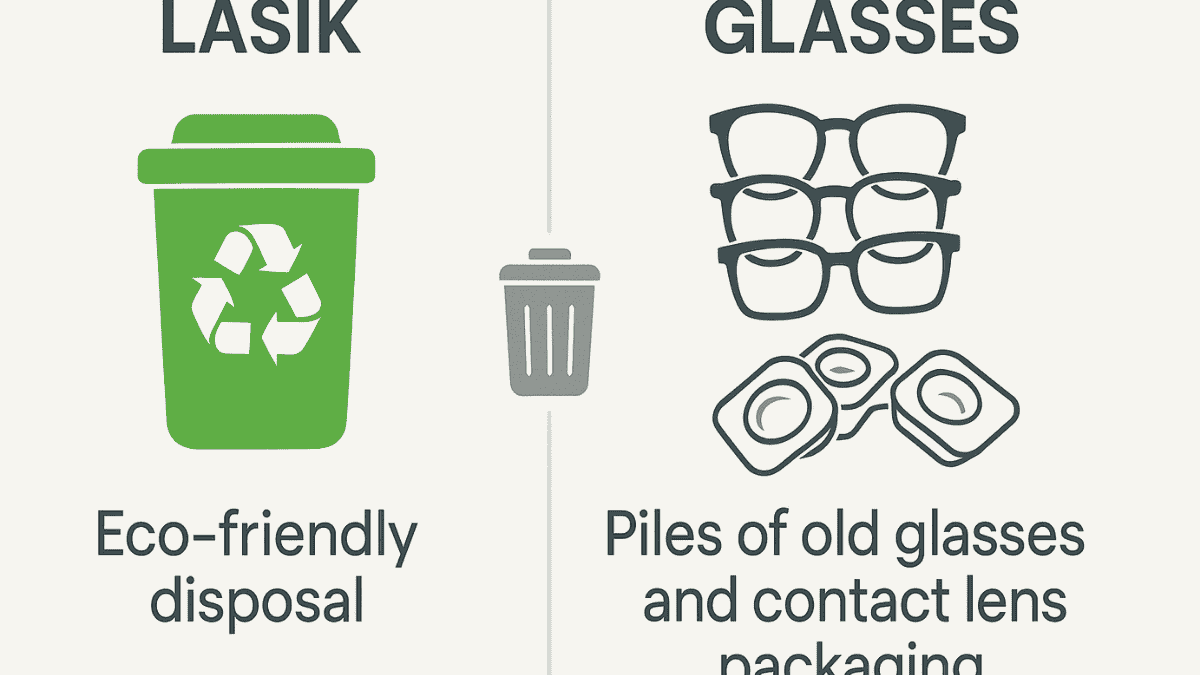
Conclusion
The choice between LASIK and glasses isn’t always clear-cut, as both offer distinct benefits for vision correction. LASIK offers significant convenience and potentially better unaided distant vision, but it comes with the considerations of a surgical procedure, including surgical risks and a higher upfront surgery cost. Glasses are versatile, low-risk, and adaptable, but they can be inconvenient for some lifestyles and represent a recurring cost over many years.
Your decision should be based on a careful evaluation of your lifestyle, budget, the nature of your refractive error, and personal preferences. It’s highly recommended to consult with an experienced eye care professional or eye surgeon. They can help you weigh the pros and cons of LASIK vs glasses specifically for your unique needs and determine if you are a good candidate for lasik eye surgery or if other surgery options, or continuing with corrective lenses, would be a good option.
Remember, there’s no one-size-fits-all answer in the lasik correct versus glasses debate. What matters most is choosing the option that will provide you with the highest level of visual quality and comfort, supporting your quality of life and clear vision for years to come. Whether it’s the permanent change offered by laser surgery or the adaptability of wearing glasses, the best choice is the one that fits you.
Yes, LASIK can be more cost-effective in the long term despite its high upfront cost. Over 10–20 years, the recurring cost of glasses or contacts can surpass the one-time cost of LASIK.
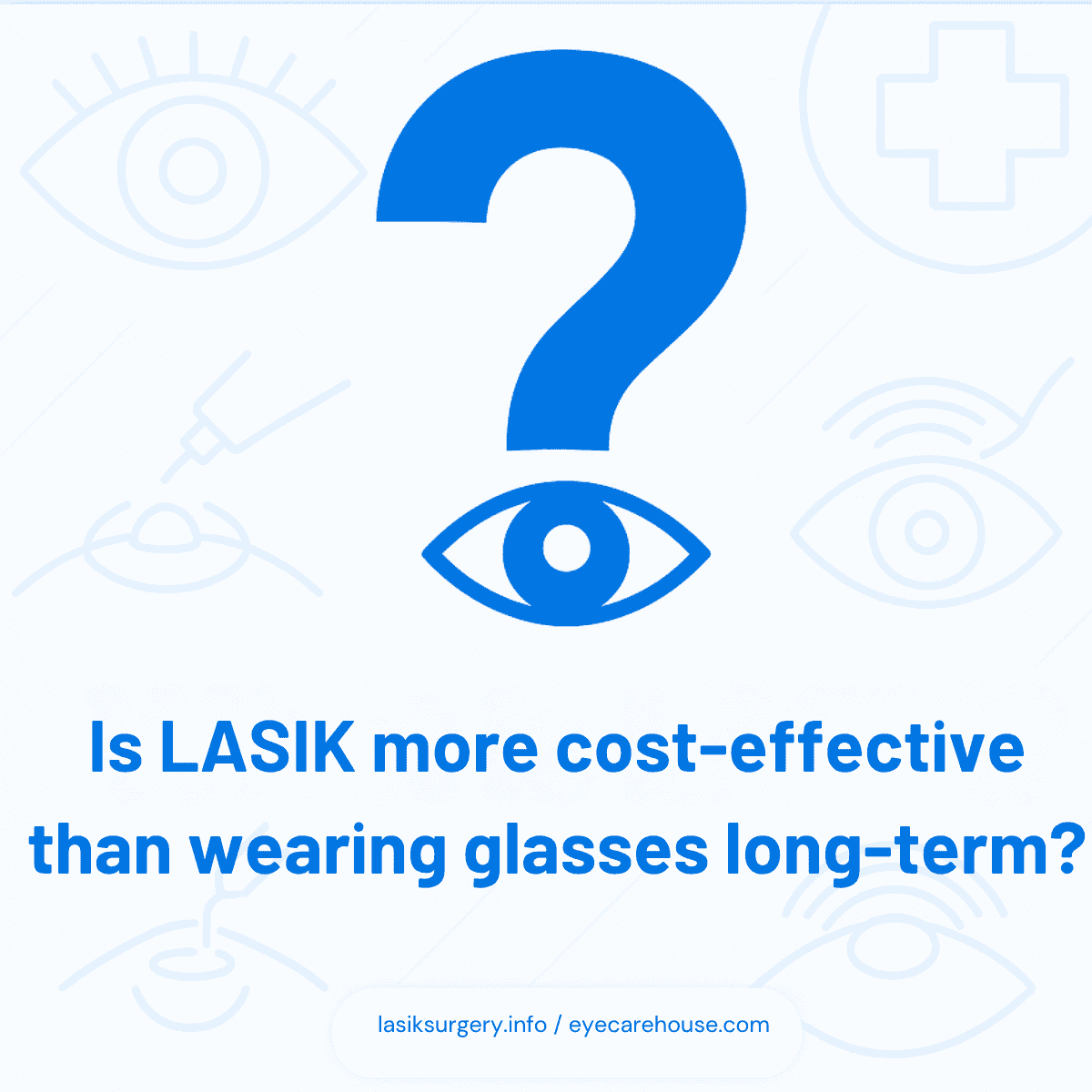
LASIK reshapes the cornea using a laser to correct the eye’s refraction, whereas glasses bend incoming light to focus it correctly on the retina externally.
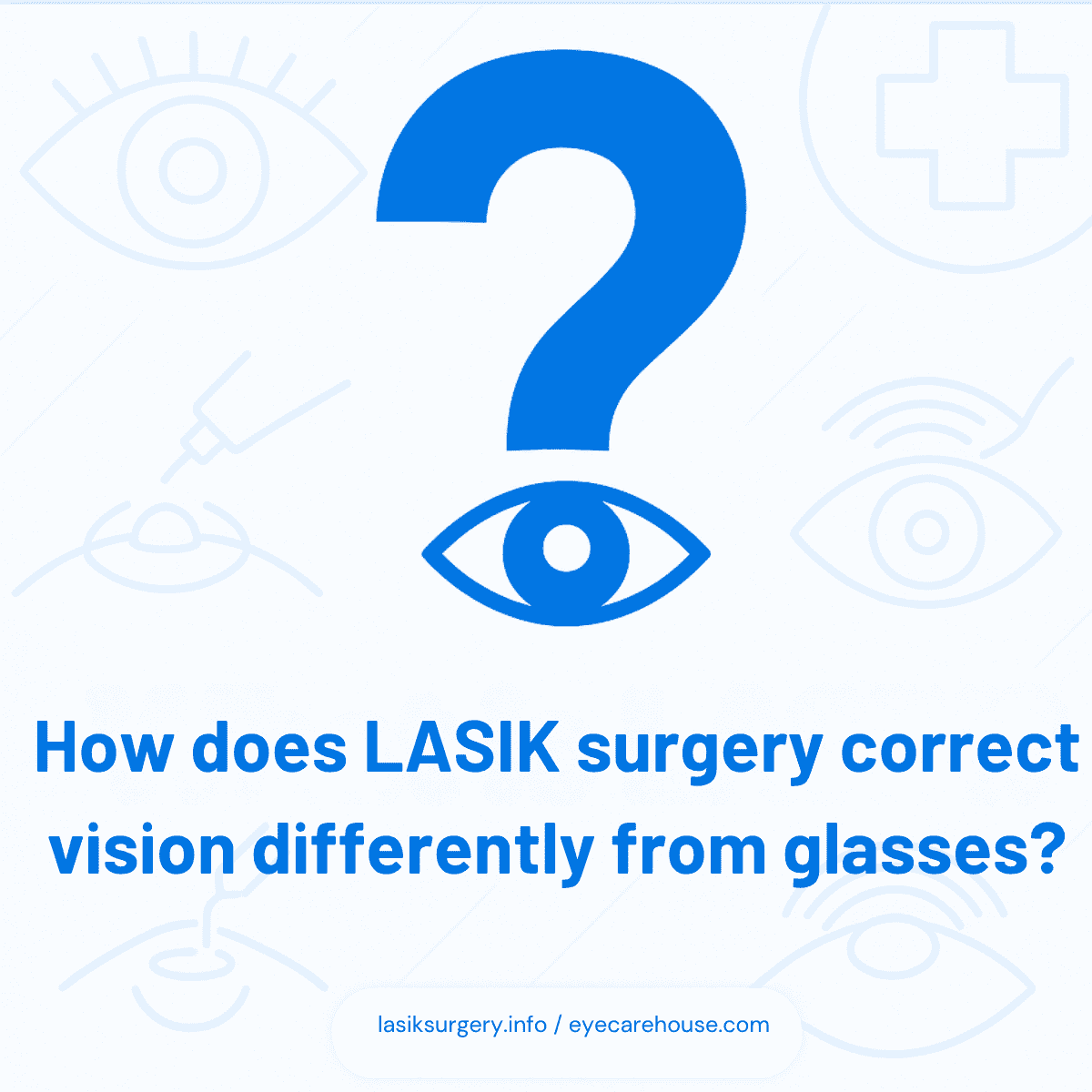
LASIK offers a long-term solution, often lasting decades. However, age-related conditions like presbyopia may still require reading glasses later in life.
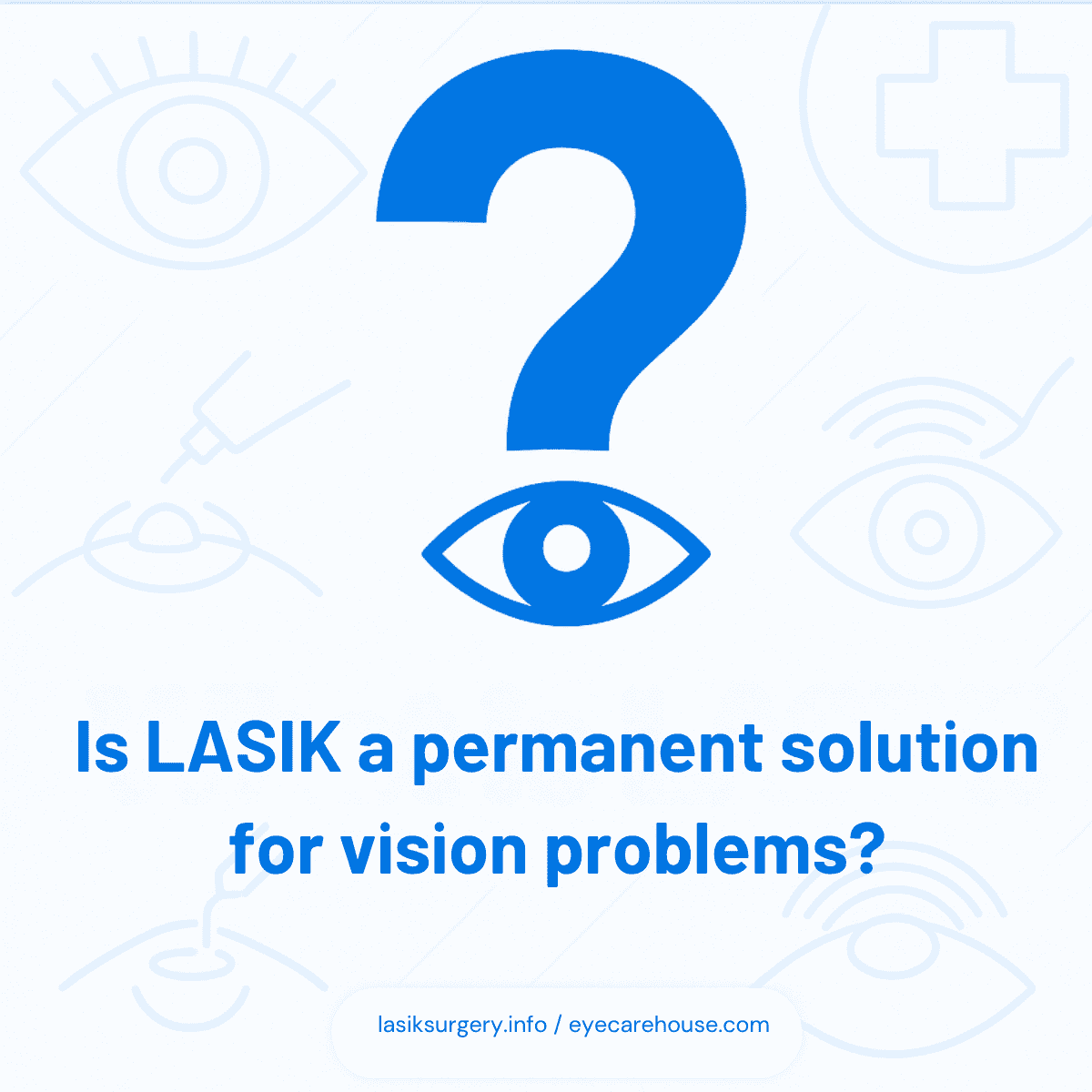
LASIK provides freedom from daily eyewear hassles, making it easier to play sports, travel, swim, and enjoy other activities without worrying about glasses.
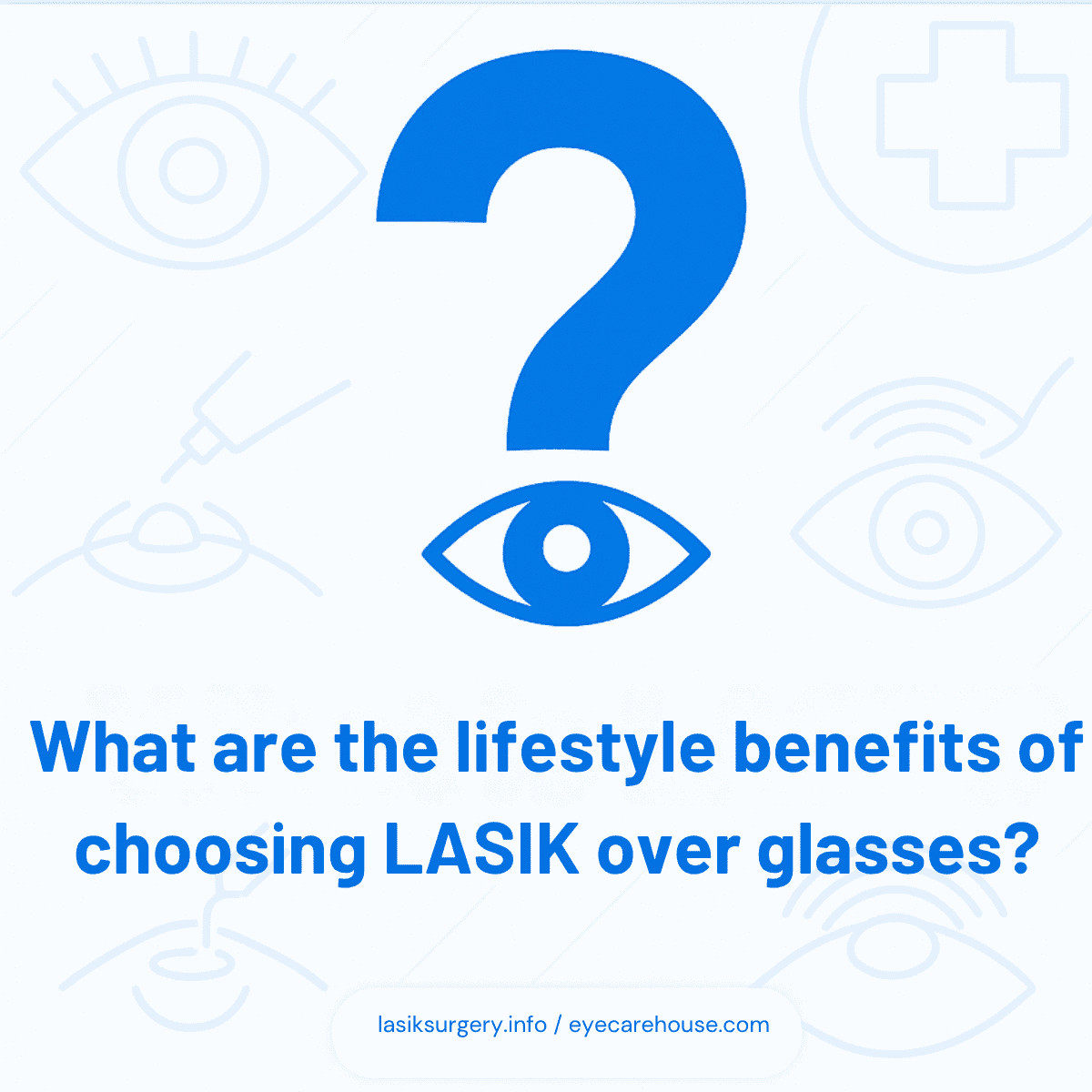
Yes, while generally safe, LASIK can lead to temporary side effects like dry eyes, halos, and glare. Most issues resolve over time with proper care.
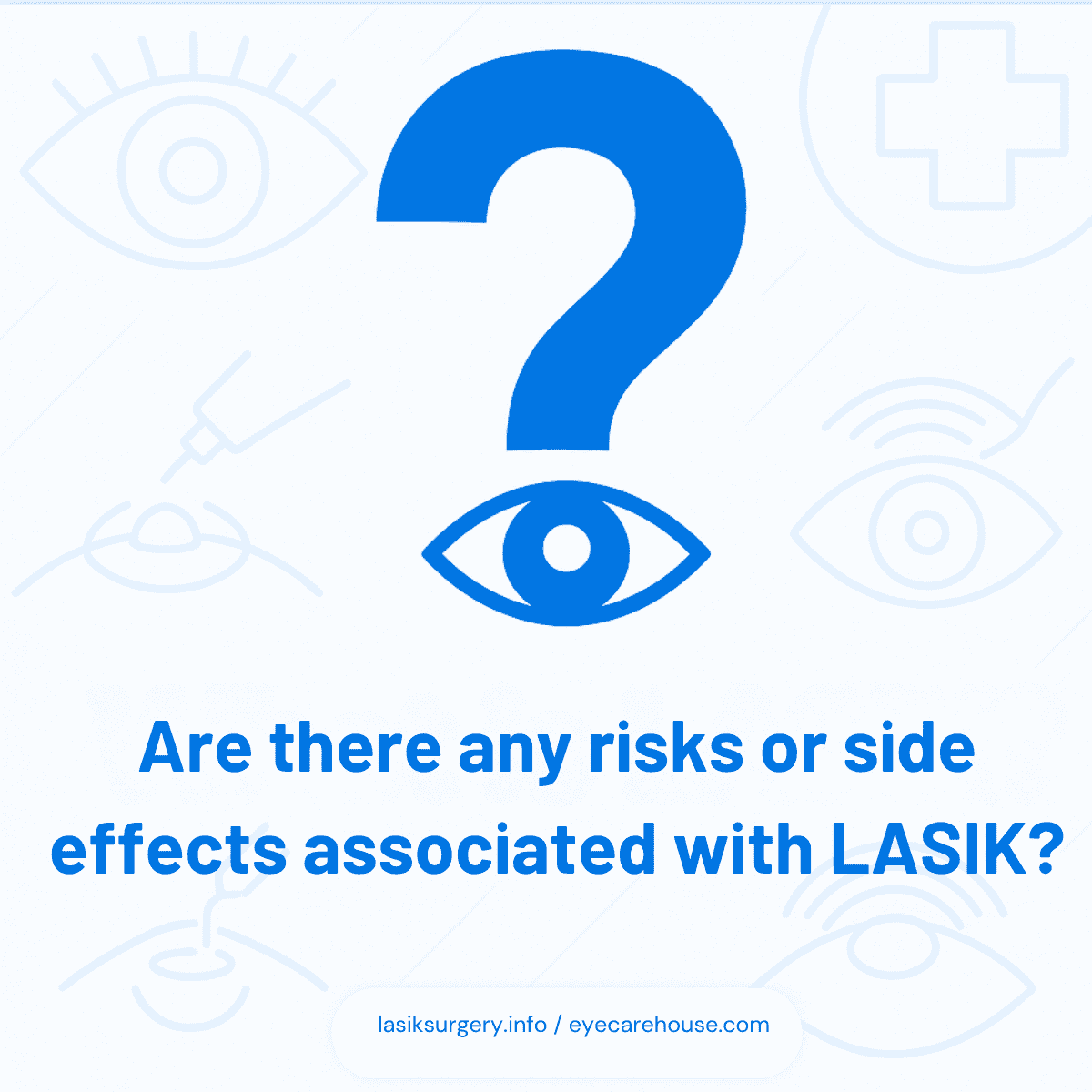
LASIK often eliminates the need for glasses for distance vision. However, for reading or age-related changes, some may still require corrective lenses.
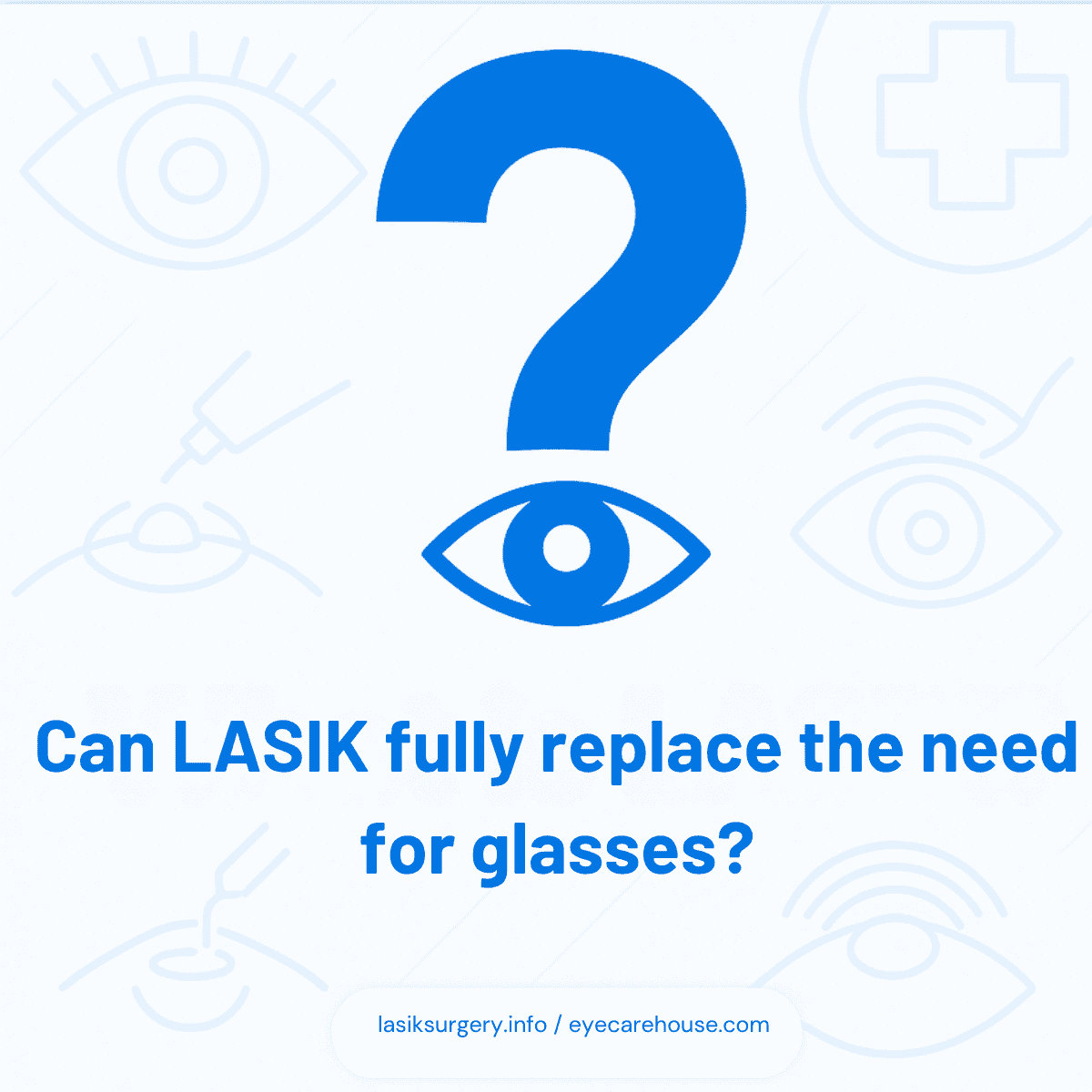
Ideal candidates are over 18, with stable vision, no severe eye conditions, and overall good health. A consultation is needed to confirm eligibility.
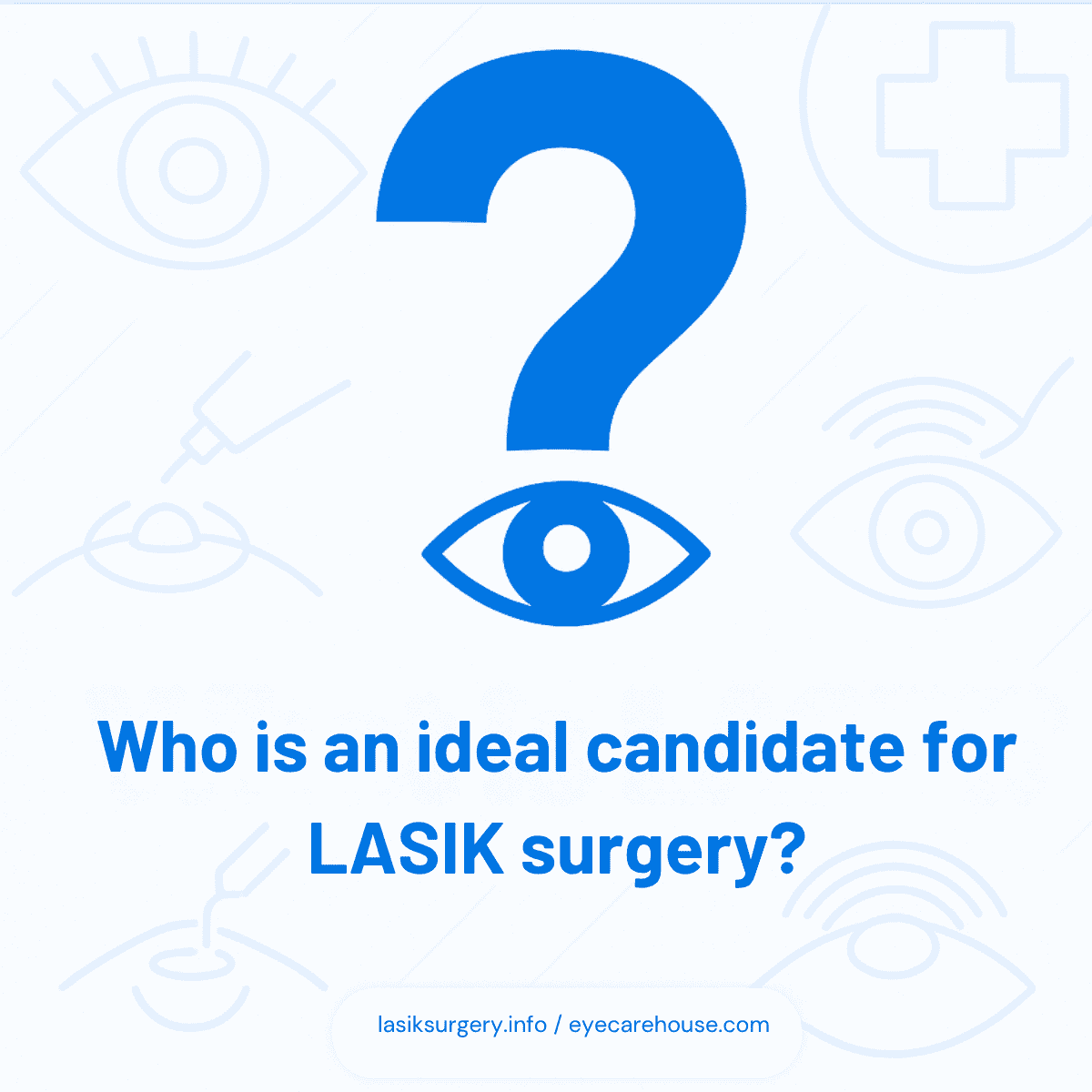
LASIK provides excellent clarity and often improves night vision. Glasses also offer sharp vision but may cause reflections or distortions in some situations.
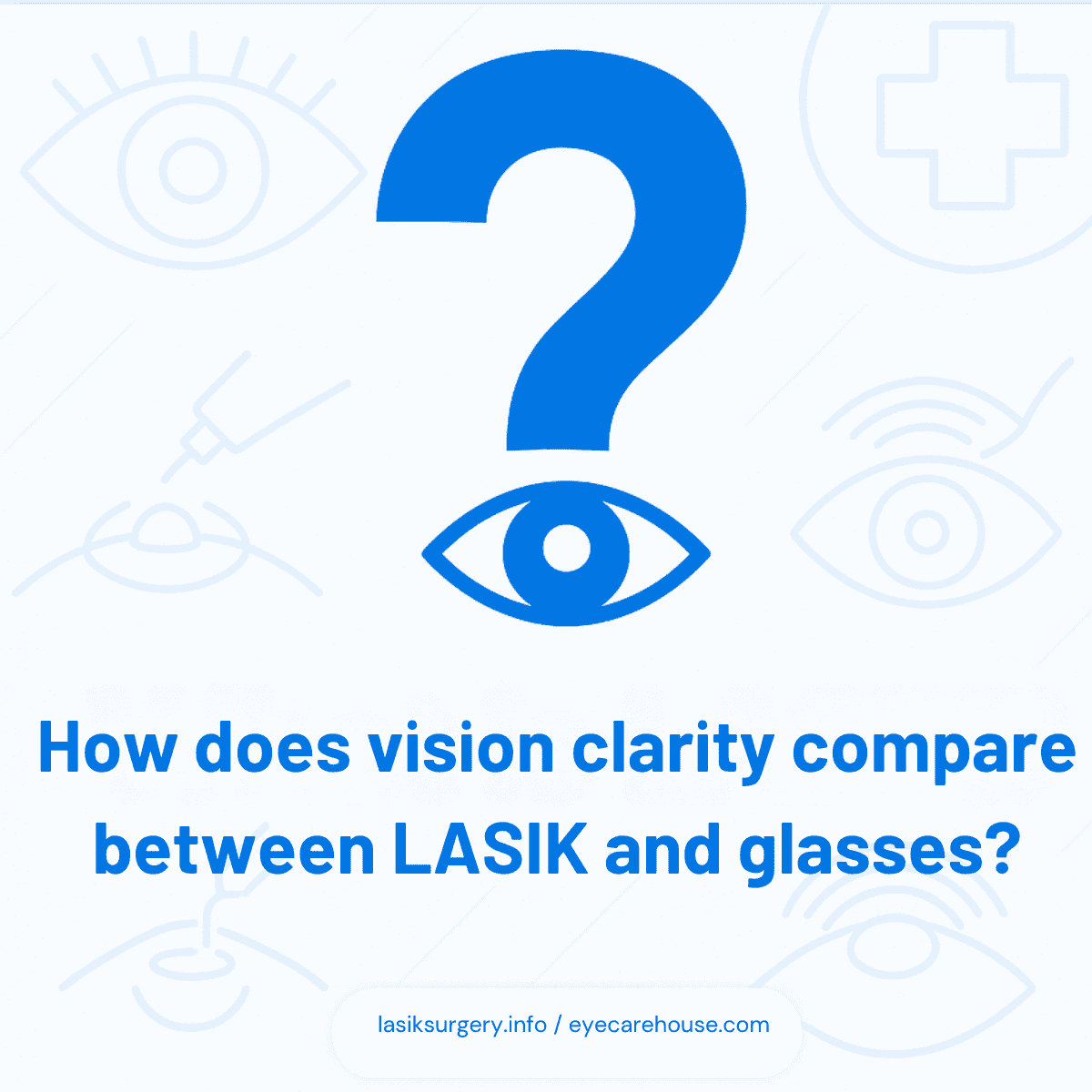
Yes, prior LASIK may affect intraocular lens measurements in cataract surgery, so informing your surgeon is important for accurate planning.
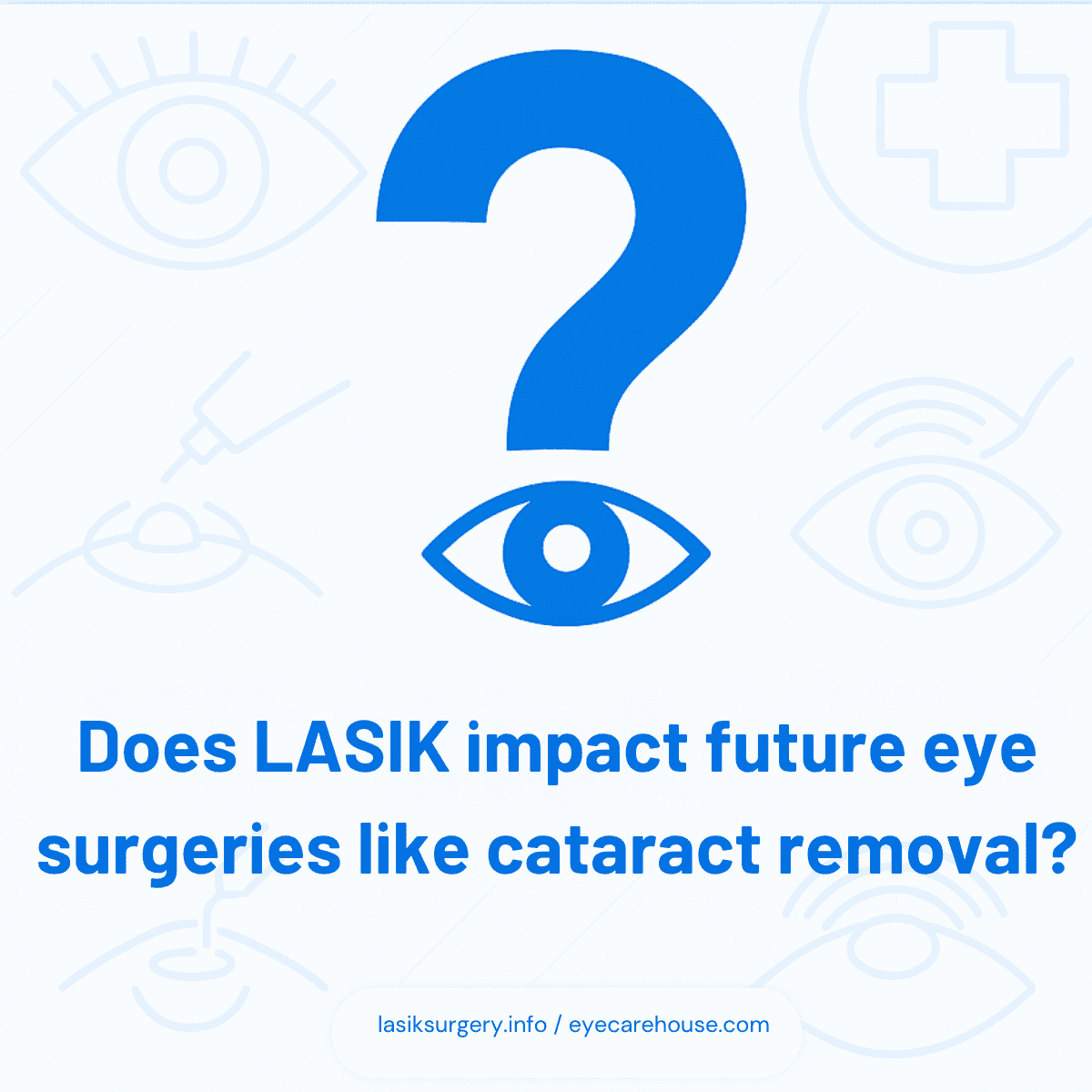
LASIK produces minimal recurring waste, while glasses and contacts create ongoing plastic waste. Some eyewear is recyclable, but LASIK has lower lifetime impact.
